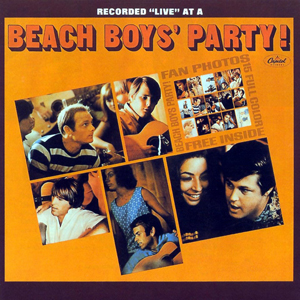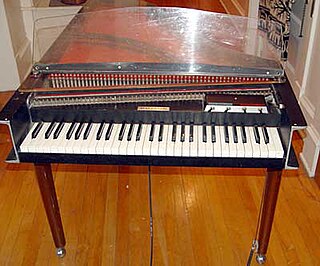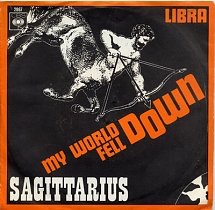Art rock is a subgenre of rock music that generally reflects a challenging or avant-garde approach to rock, or which makes use of modernist, experimental, or unconventional elements. Art rock aspires to elevate rock from entertainment to an artistic statement, opting for a more experimental and conceptual outlook on music. Influences may be drawn from genres such as experimental music, avant-garde music, classical music, and jazz.

Pet Sounds is the eleventh studio album by the American rock band the Beach Boys, released on May 16, 1966 by Capitol Records. It was initially met with a lukewarm critical and commercial response in the United States, peaking at number 10 on the Billboard Top LPs chart. In the United Kingdom, the album was lauded by critics and reached number 2 on the Record Retailer chart, remaining in the top ten for six months. Promoted there as "the most progressive pop album ever", Pet Sounds was recognized for its ambitious production, sophisticated music, and emotional lyrics. It is now considered to be among the greatest and most influential albums in music history.

Bruce Arthur Johnston is an American singer, musician and songwriter who is a member of the Beach Boys. He also collaborated on many records with Terry Melcher and composed the 1975 Barry Manilow hit, "I Write the Songs".

Surfer Girl is the third studio album by the American rock band the Beach Boys, released September 16, 1963 on Capitol Records. It is largely a collection of surf songs. The LP reached number 7 in the U.S. and number 13 in the UK. Lead single "Surfer Girl", backed with "Little Deuce Coupe", was also a top 10 hit.

Beach Boys' Party! is the tenth studio album by American rock band the Beach Boys, and their third in 1965, consisting mostly of cover songs played with acoustic instruments. It reached No. 6 in the US and No. 3 in the UK. The album spawned one single, a cover of the Regents' "Barbara Ann", which reached No. 2 in the US and No. 3 in the UK, and was their highest-charting British single to that point.

Curtis Roy Boettcher, sometimes credited as Curt Boetcher or Curt Becher, was an American singer, songwriter, arranger, musician, and record producer from Wisconsin. He was a pivotal figure in what is now termed "sunshine pop", working with the Association, the Millennium, Sagittarius, Paul Revere and the Raiders, Tommy Roe, Elton John, Gene Clark, Emitt Rhodes, Tandyn Almer, the Beach Boys, and others.
Sunshine pop is a subgenre of pop music that originated in Southern California in the mid-1960s. Rooted in easy listening and advertising jingles, sunshine pop acts combined nostalgic or anxious moods with "an appreciation for the beauty of the world". The category largely consists of lesser-known artists who imitated more popular groups such as the Mamas & the Papas and the 5th Dimension. While the Beach Boys are noted as prominent influences, the band's music was rarely representative of the genre.

The Music Machine was an American rock band formed in Los Angeles, California in 1966. Fronted by chief songwriter and lead vocalist Sean Bonniwell, the band cultivated a characteristically dark and rebellious image reflected in an untamed musical approach. Sometimes it made use of distorted guitar lines and hallucinogenic organ parts, punctuated by Bonniwell's distinctively throaty vocals. Although they managed to attain national chart success only briefly with two singles, the Music Machine is today considered by many critics to be one of the groundbreaking acts of the 1960s. Their style is now recognized as a pioneering force in proto-punk; yet within a relatively short period of time, they began to employ more complex lyrical and instrumental arrangements that went beyond the typical garage band format.

Baroque pop is a fusion genre that combines rock music with particular elements of classical music. It emerged in the mid 1960s as artists pursued a majestic, orchestral sound and is identifiable for its appropriation of Baroque compositional styles and dramatic or melancholic gestures. Harpsichords figure prominently, while oboes, French horns, and string quartets are also common.
Gary Lee Usher was an American rock musician, songwriter, and record producer, who worked with numerous California acts in the 1960s, including the Byrds, the Beach Boys, and Dick Dale. Usher also produced fictitious surf groups or hot rod groups, mixing studio session musicians with his own troops. These bands included the Super Stocks ; the Kickstands; plus the Hondells with their No. 9 US pop single "Little Honda"; and others.
Sagittarius was an American sunshine pop studio group formed in 1967, devised by record producer and songwriter Gary Usher.

The High Llamas are an Anglo-Irish avant-pop band formed in London circa 1991. They were founded by singer-songwriter Sean O'Hagan, formerly of Microdisney, with drummer Rob Allum and ex-Microdisney bassist Jon Fell. O'Hagan has led the group since its formation. Their music is often compared to the Beach Boys, a band he acknowledges as an influence, although more prominent influences were drawn from bossa nova and European film soundtracks.

"Sloop John B" is a Bahamian folk song from Nassau. A transcription was published in 1916 by Richard Le Gallienne, and Carl Sandburg included a version in his The American Songbag in 1927. There have been many recordings of the song since the early 1950s, with variant titles including "I Want to Go Home" and "Wreck of the John B".

"The Little Girl I Once Knew" is a song by the American rock band the Beach Boys that was issued as a standalone single on November 22, 1965. Written and produced by Brian Wilson, it was recorded during the making of the band's 1966 album Pet Sounds.
"Can't Wait Too Long" is a song written by Brian Wilson for the American rock band the Beach Boys. The song dates from 1967, and remains unfinished by the group. In 2008, a newly recorded "Can't Wait Too Long" was released for Wilson's solo album That Lucky Old Sun.
John Nicholas Shakespeare, known as John Carter, is an English singer, songwriter, and record producer.
"Fall Breaks and Back to Winter " is an instrumental composed by Brian Wilson for American rock band the Beach Boys. Released in 1967 as the third track on the group's album Smiley Smile, the composition derives from "Fire" – a piece recorded by Wilson several months earlier, but left unreleased due to his paranoia.
Experimental pop is pop music that cannot be categorized within traditional musical boundaries or which attempts to push elements of existing popular forms into new areas. It may incorporate experimental techniques such as musique concrète, aleatoric music, or eclecticism into pop contexts. Often, the compositional process involves the use of electronic production effects to manipulate sounds and arrangements, and the composer may draw the listener's attention specifically with both timbre and tonality, though not always simultaneously.

"Get Me to the World on Time" is a song written by Annette Tucker and Jill Jones for the American garage rock band, The Electric Prunes. The song was released in May 1967 following the success of the band's previous single, "I Had Too Much to Dream ". Although the follow-up did not have the same success, "Get Me to the World on Time" still charted at number 27 on the Billboard Hot 100. The single also fared slightly better in the UK, where it reached number 42.

"Smell of Incense" is a song by the American psychedelic rock band the West Coast Pop Art Experimental Band, written by Ron Morgan and Bob Markley, and was released as a single on Reprise Records in 1968.












